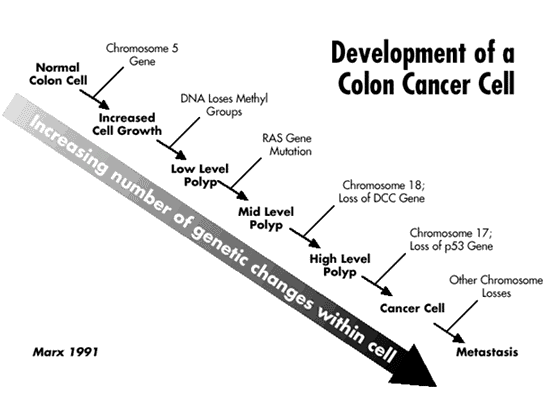Researchers identify efficient methylating enzyme for cancer development

|
A recent study may help begin to explain how cancer develops though the abnormal turning on and off of genes. Researchers have discovered that the increase of methyl tags in cancer cells is due to highly efficient DNA methyl transferase 1 (DNMT1) enzymes found in these cells. The findings appear in the Journal of Proteomics and Bioinformatics.
Both plants and animals have genetic machinery that modifies the information and function of their genomes without actually changing their genetic code. This modification process is known as “epigenetics.” One of the best studied of these epigenetic processes involves the chemical tagging of DNA nucleotides across the genome using methyl groups. These “methyl tags” are attached to cytosine nucleotides in specific patterns around genes and other expressed sequences by a specialized group of enzymes called methyltransferases.
Genes that are expressed and turned into proteins are free of “methyl” tags, but when such methyl tags attach to DNA, gene expression is turned off. “Whether methyl tags are added to genes varies during normal development and during the development of diseases like cancer, and understanding these processes is currently a major topic of research,” explained corresponding author Sibaji Sarkar, PhD, instructor of medicine at Boston University School of Medicine (BUSM). According to Sarkar it was previously discovered that cancer cells have more methyl tags than normal cells and level of the enzyme which adds the tag, DNA methyl transferase1 (DNMT1) is also higher, but no one knew that both increases are not proportional.
The researchers focused on two types of cells - cancer cells and normal healthy cells. For each cell type, they used mathematical Hill equation to determine whether the methylation status (methyl tags present as compared to those which were absent) of eight selected genes correlated with the amount of DNA methyl transferase1 (DNMT1) enzyme present in the cells. They found that the enzyme that adds these tags (DNMT1) worked more efficiently in genes which are silenced in cancer cells as compared with normal healthy cells. Interestingly, the enzyme did not work efficiently with the genes which are not silenced by methylation in cancer cells. This increase in enzyme activity is called allostericity and it is observed in many cellular processes including addition of oxygen to hemoglobin to carry oxygen efficiently. The outstanding mystery which remains to be solved is, how this enzyme selectively chooses some genes to efficiently methylate.
“Since this highly efficient DNMT1 enzyme can promote cancer development, using a drug that inhibits this allosteric increase in enzyme activity may someday be beneficial for cancer treatment, because it will target the super active methylation process in cancer cells. We are developing a combination therapy that uses this type of epigenetic drugs in combination with other more traditional drugs, and researchers have shown that such treatments are effective and able to reduce cancer relapse,” he said. The idea behind the addition of epigenetic drugs in combination therapy is to make cancer cells susceptible and possibly kill cancer progenitor cells and drug resistance cancer cells.
Sarkar and his colleagues believe these findings begin to clarify how the regulation of DNMT1 impacts the normal and abnormal addition of methyl tags, and thus, gene transcription in general. “Hopefully, through this and future work, we will discover the molecular mechanisms that lead to differential silencing and expression of genes during human development from embryogenesis and the aberration of this process in many diseases including cancer development. This knowledge will hopefully develop methods of counteracting these mechanisms and treating cancer,” he added. The discovery that DNMT1 efficiently methylate selective genes brings us one step closer to the idea of “on” and “off” switch of cancer development. Recent studies have shown that genes are transcriptionally silenced by the creation of an insulated area, which regulate enhancer and transcription factor interactions. The formation and deformation of these areas in development and disease conditions including cancer possibly are regulated by this highly efficient methylation mechanism.
###
Also contributing to this study were first author Eric Samorodnitsky, PhD from Ohio State University, Boston University student Emily Ghosh and Sahana Mazumder, PhD from Rammohan College, University of Kolkata.
Partial funding of Sarkar’s laboratory work was provided by a grant from the American Cancer Society.
###
Gina DiGravio
.(JavaScript must be enabled to view this email address)
617-638-8480
Boston University Medical Center
Journal
Journal of Proteomics and Bioinformatics
Funder
American Cancer Society
Print Version
Tell-a-Friend comments powered by Disqus





